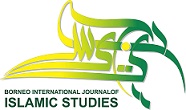Konsep Qath’i dan Zhanni dalam Hukum Kewarisan Islam
Abstract
The term qath'i (definitive) and zhanni (speculative) in Usul al-Fiqh is used to explain the sources of Islamic legal texts either the Qur'an or Hadith in two ways, namely al-tsubût (existence) or al-wurud (sourced from the truth), and al-dalalah (textual implication). In terms qath'i and zhanni al-tsubut and al-wurud, Islamic jurists agree that the Koran and the hadith mutawatir is definitive, whereas ahad hadith is zhanniy ats-tsubut. They differ in terms of qath'i and zhanni of the al-dalalah (interpretation). Islamic jurists state that if a text of the Koran or Hadith contains only one meaning that is clear and not open up to other possible interpretations, as well as read certain numbers, then the text is regarded as the definitive text of textual implication. The texts relate to inheritance law fall into the category this qath`i al-dalalah. Meanwhile, contemporary Islamic jurists state that the qath'i and zhanni al-dalalah of the texts both the Koran and the hadith cannot be seen from the clarity of meaning of the texts but also on the desired essence of the text which is commonly known as the maqasid al-shari'ah. The maqasid approach must also be coupled with the theory ta'abbudi and ta'aqquli. Based on this, this article argues that the texts related to Islamic inheritance law is categorized zhanni al-dalalah because they concern of human social relations (mu`amalah) which are affected by the socio-economic context of the role of men and women in society (ta`aqquli). Consequently, the texts in the field of inheritance law are open to modern interpretations.
Keywords: Islamic inheritance law, qath'i and zhanni in Islam
References
Abū Zahrah , Muhammad, Ushūl al-fiqh, (Kairo: Dār al-Fikr al-Arabi, t.th
Al-Khallaf, Abdul Wahab, Ilmu Ushūl al-fiqh, Kairo: Maktabah al-Dakwah al Islāmiyah, 1990
Al-Maqdisiy, Ibnu Al Mugniy, Juz VI , Kairo: Dār al-Manar. t.th
Al-Qaththān, Manna’, Pengantar Studi Hadis, ter. Mifdhol Abdurrahman Jakarta: Pustaka al Kautsar, 2004
Al-Syātibi, Abi Ishaq, Al Muwāfaqāt fī Ushul al-Ahkām, Juz ke 1, Dār al Fikr: Beirut, T.th
Al-Zuhaili , Wahbah, Ushul fikih al-Islmai, Beirut: Dār al-Fikr, 2001
Ar-Rahīm, Muhammad Abd, Al Muhadarat fi al mirāṣ, Kairo: tp, tt
Ar-Rāzi, Fakhr ad Dîn, al Mahshūl fī ‘Ilm al-Ushūl, Juz II, Saudi Arabia: Maktabah Nizar Musthafa, 1997
Asy Syahrastāny, a Milal wa an Nihal, terj.Ahmad Fahmi Muhammad Beirut: Dār al-Kutub al- ‘Ilmiyah, 1992
Asy-Syawkāni , Muhammad bin ‘Ali, Irsyād al-Fuhūl ilā Tahqīq al-Haqq min ‘Ilm al-Ushūl, juz 1, Beirut, Libanon: Dār al-Khayr, 1990
F. Mas’udi , Masdar, Agama Keadilan, Risalah Zakat , Pajak) dalam Islam, cet ke 3, Jakarta: Pustaka Firdaus, 1991
Haries, Akhmad. “Gagasan Pembaruan Dalam Bidang Hukum Kewarisan.” Mazahib 13, no. 2 (2014). doi:10.21093/mj.v13i2.121.
Hazm, Ibnu, Al Muhalla, JUz IX, Beirut: Dar al Fikr,tt
Kamali, Mohammad Hashim, Principles of Islamic Jurisprudence, Kuala Lumpur: Pelanduk Publication, 1989
Lasmana, Nunung. “Wakaf Dalam Tafsir Al-Manar (Penafsiran Atas Surat Al-Baqarah Ayat 261-263 Dan Ali ‘Imran Ayat 92).” Al-Tijary : Jurnal Ekonomi Dan Bisnis Islam 1, no. 2 (1 Juni 2016). http://journal.iain-samarinda.ac.id/index.php/altijary/article/view/530.
Muhammad Hasnain Makhluf (ed.), juz 1, Bairut: Dār al-Fikr,tt
Musa, Muhammad Yusuf, al Tirkah wa al-Mirāts Fi al-Islām, Kairo: Dār al-Kitab al-Arabi, 1959
Nafis, Muhammad Wahyuni, et.all (eds.), Kontekstualisasi Ajaran Islam: 70 Tahun Prof. Dr. H. Munawir Sjadzali, MA, Jakarta: Ikatan Persaudaraan Haji Indonesia dan Yayasan Paramadina, 1995
Nasution, Rachmad Saleh. “Sistem Operasional Pegadaian Syariah Berdasarkan Surah Al-Baqarah 283 Pada PT. Pegadaian (Persero) Cabang Syariah Gunung Sari Balikpapan.” Al-Tijary : Jurnal Ekonomi Dan Bisnis Islam 1, no. 2 (1 Juni 2016). http://journal.iain-samarinda.ac.id/index.php/altijary/article/view/529.
Noel J. Coulson, A History of Islamic Law, Edinburg: Edinburg Press, 1964
Shihab, M. Quraish, 1992, Membumikan al-Qur’an: Fungsi dan Peran Wahyu dalam Kehidupan Masyarakat,(Bandung: Penerbit Mizan, 1992.
Syarifuddin , Amir, Ushul fikih, Jilid 2, Jakarta: Logos Wacana Ilmu, 1999
Zaidan, Abdul Karim, al-Wajīz fi Ushūl al-Fiqh, Baghdad: Dār al-Arabiyah, 1977
Zamahsyari, Abi Qasim Mahmud bin Umar, Al-Kasysyāf, Juz ke 1, Musthafa al Babi al-Halabi, Mesir, 1972.
Zuhri , Saefudin, Ushul fikih, Akal Sebagai Sumber Hukum Islam, Yogyakarta : Pustaka Pelajar, 2009.


.png)






